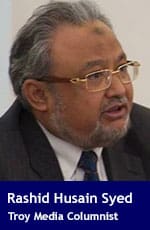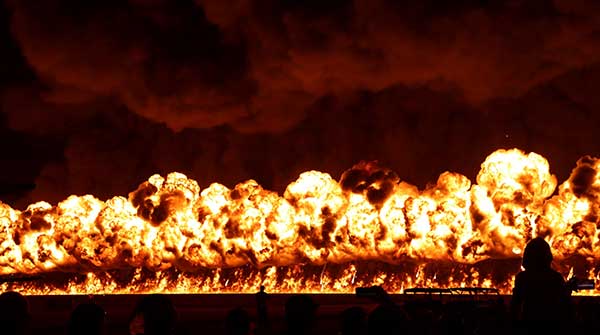Warning by Israel of ‘significant retaliation’ against Iran sparks fears of economic disaster

For interview requests, click here
The drums of war are sounding, and the world is facing the threat of disruptions to the global oil supply. This uncertainty leaves many wondering which direction energy markets will go in if such disruptions occur.
Former NATO Chief Admiral James Stavridis has warned that rising tensions in the Middle East could lead to dire global consequences. “What makes this moment dangerous, just like the days before (the Second World War), is the rise of strategic tension with China in the Pacific,” he said in an interview on “The Cats Roundtable” on New York’s WABC 770 AM. “You’ve got a pretty significant ground war going in Europe, of course, because of the invasion of Ukraine by Vladimir Putin. And you’ve got this enormous disturbance parked on the Middle East between Israel and Iran, which could, in the worst-case scenario, shut down oil coming out of the Middle East.”
“When you put all that together, it’s as turbulent a moment as I think you could find going back to the late 1930s,” Ashleigh Fields quoted Stavridis as saying in her piece in The Hill.
Yet, despite Iran’s relatively restrained response to the Israeli strikes on Hezbollah and the killing of Hassan Nasrallah, the threat of retaliatory attacks against Iranian interests by Israel still looms large.
Israeli Prime Minister Benjamin Netanyahu, fighting for his political survival, has warned that Tehran made a “big mistake” and would “pay for it.” Israeli officials have also pledged a “significant retaliation,” sparking speculation that Israel may target Iran’s oil, military, or nuclear infrastructure. Avner Cohen, a professor of non-proliferation and terrorism studies at the Middlebury Institute of International Studies in the United States, was quoted as saying that Israel is most likely to focus on striking the Iranian regime and military. Any of these options could lead to economic, geographical, and global disaster.
But, as the war clouds continue to gather in the region and beyond, diplomatic activity is ramping up. Major stakeholders are making strategic moves on the geopolitical chessboard, attempting to outmanoeuvre each other. Energy diplomacy has become a key part of these efforts, as nations seek to protect their interests amidst the growing uncertainty.
In the past 10 days, the region has seen a surge of high-level diplomatic activity. Iranian President Masoud Pezeshkian landed in Doha and met Gulf Cooperation Council (GCC) officials. Last Wednesday, Iranian Foreign Minister Abbas Araqchi travelled to Riyadh to talk with Saudi Crown Prince Mohammed bin Salman. All these moves were closely watched, but the key question remains: what exactly was discussed behind closed doors?
The mystery surrounding these meetings is slowly beginning to clear. According to reports, Iran warned Saudi Arabia during the discussions that it “could not guarantee the safety of the kingdom’s oil facilities” if Saudi Arabia were to assist Israel in any attack. A senior Iranian official and an Iranian diplomat told Reuters that Tehran delivered a clear message to Riyadh that its allies in countries like Iraq and Yemen might retaliate if there was any regional support for Israel against Iran.
Ali Shihabi, a Saudi analyst close to the Saudi royal court, told media last week: “The Iranians have stated: ‘If the Gulf states open up their airspace to Israel, that would be an act of war.’”
Saudi Arabia and its Gulf allies are cautious about any developments that could lead to similar attacks on their oil infrastructure. They are particularly concerned about avoiding a repeat of the 2019 drone attacks on the Abqaiq-Khurais facilities, which temporarily crippled the country’s oil production. Following the attacks, Saudi output dropped from 9.8 million barrels per day (bpd) to about 4.1 million bpd, a loss of 5.7 million bpd – roughly five percent of global oil supplies.
The U.S. blamed Iran for the 2019 attacks, though Iranian leaders never admitted responsibility. The attacks may have been carried out by Iranian proxies based in Iraq, but the West ultimately believed that Tehran’s finger was on the trigger.
Saudi Arabia and the GCC are feeling pressure from both sides. The U.S. maintains military bases and a troop presence in the kingdom, including substantial U.S. Air Force assets. Washington has already pledged to support Israel to repel any future Iranian ballistic missile attacks, much like it did during the last two rounds of drone and missile strikes on Israel, according to media reports.
A broader conflict between Iran and Israel would certainly result in the U.S. pressuring Saudi Arabia and the GCC to permit American fighter jets stationed in the Gulf to engage Iran. According to Reuters, Iran has explicitly warned that such co-operation from Riyadh would lead to war.
The Saudis and their Gulf partners are striving to stay neutral. On one hand, the Gulf countries are lobbying the U.S. and Israel to avoid counterattacking Iran, fearing that any escalation could prompt Tehran to target oil facilities in the Gulf. On the other, “Gulf states including Saudi Arabia, the United Arab Emirates, and Qatar are also refusing to let Israel fly over their airspace for any attack on Iran and have conveyed this to Washington,” three sources close to government circles told Reuters.
The U.S. elections, less than three weeks away, will also likely influence the next steps taken by the warring parties.
The situation remains complicated, and many are anxiously awaiting how it unfolds.
Toronto-based Rashid Husain Syed is a highly-regarded analyst specializing in energy and politics, with a particular emphasis on the Middle East. Besides his contributions to local and international newspapers, Rashid frequently lends his expertise as a speaker at global conferences. Organizations such as the Department of Energy in Washington and the International Energy Agency in Paris have sought his insights on global energy matters.
Explore more on Middle East, Terrorism, Iran, Israel, Energy security
The opinions expressed by our columnists and contributors are theirs alone and do not inherently or expressly reflect the views of our publication.
Troy Media
Troy Media is an editorial content provider to media outlets and its own hosted community news outlets across Canada.

